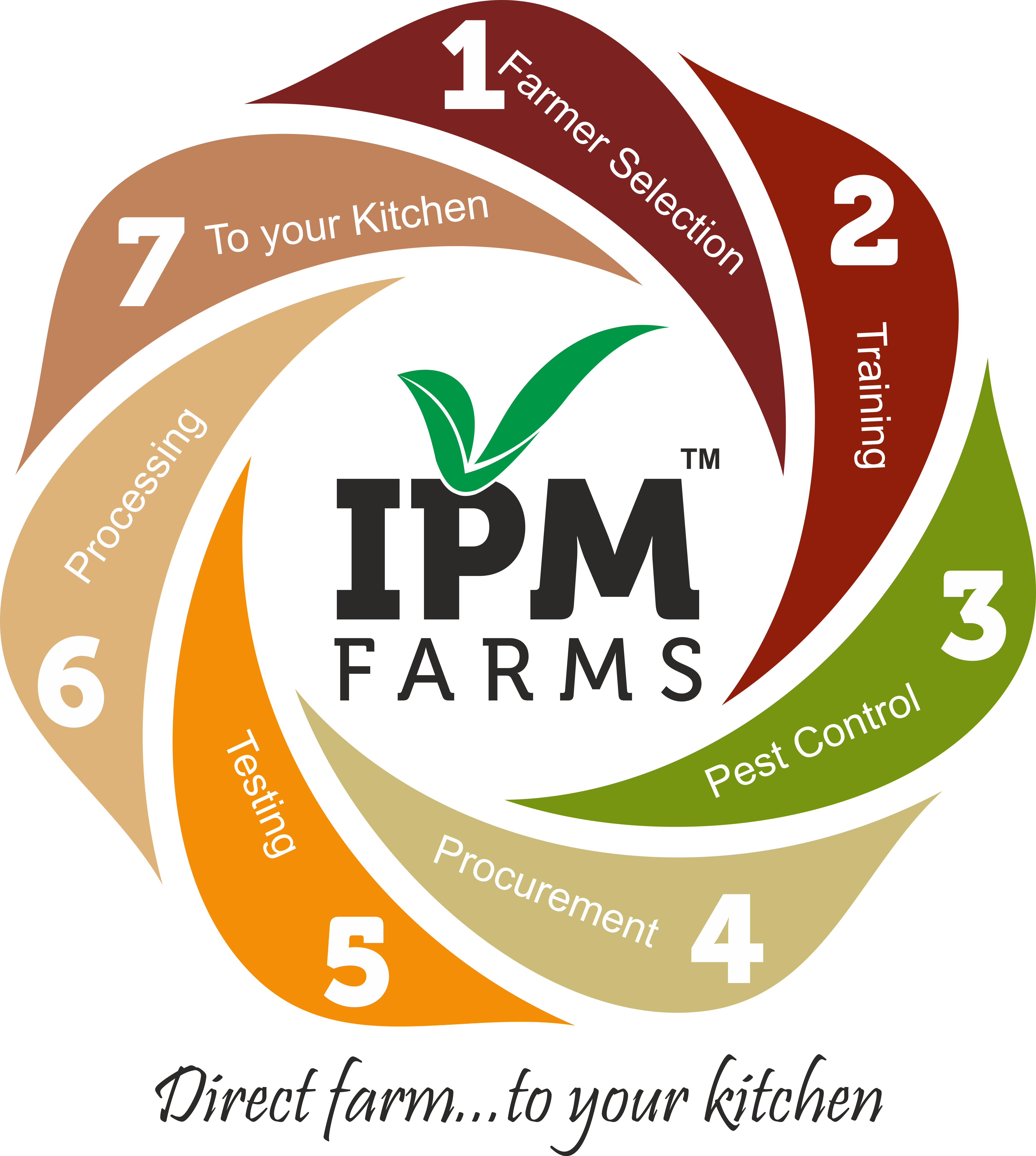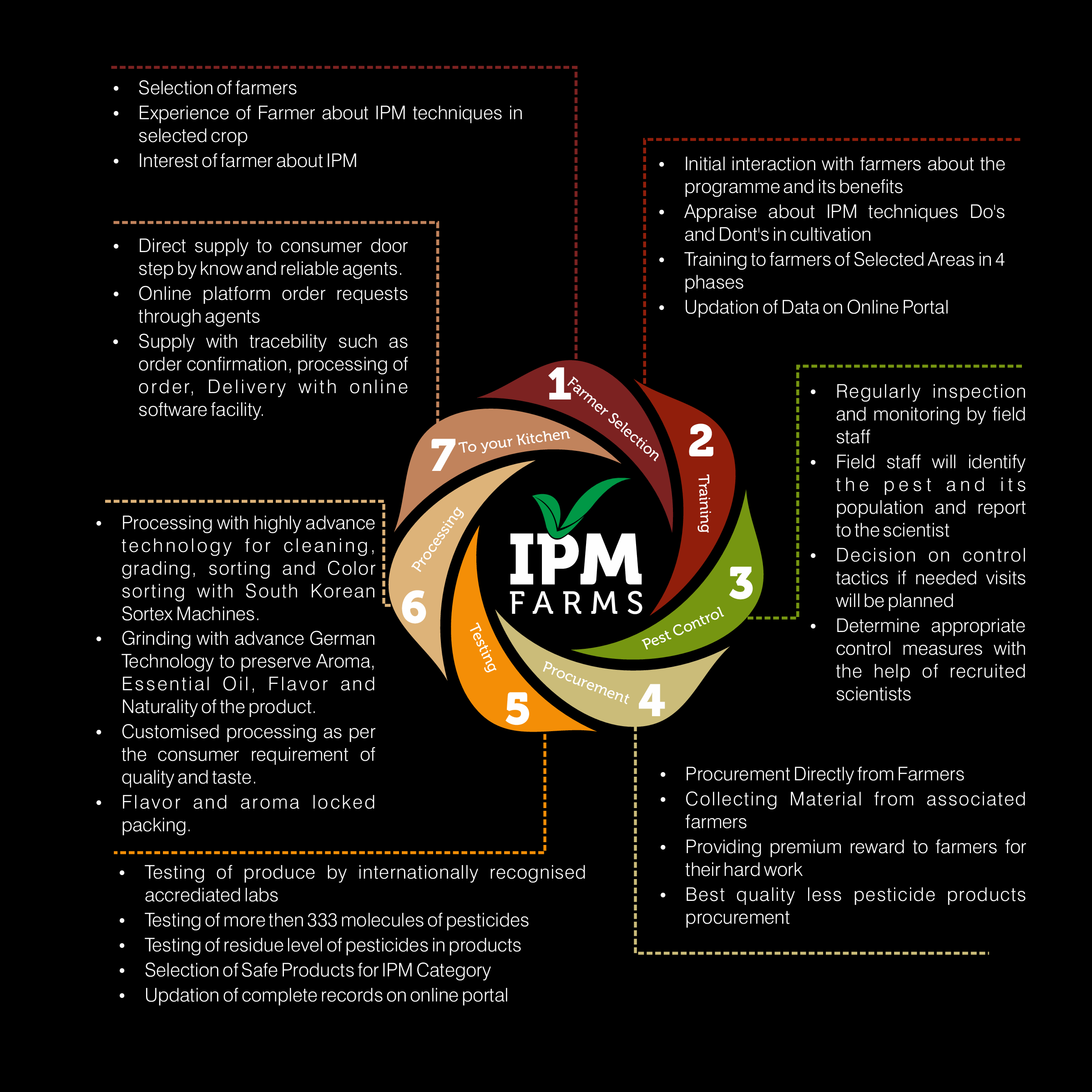- Home
- IPM

Integrated Pesticides Management
INTEGRATED PESTICIDES MANAGEMENT
IPM approach minimizes the use of chemicals and emphasizes natural and low toxicity methods to control pests in agricultural production.
What is IPM?
Integrated Pest Management (IPM)
IPM means the careful consideration of all available pest control techniques and subsequent integration of appropriate measures that discourage the development of pest populations and keep pesticides and other interventions to levels that are economically justified and reduce or minimize risks to human health and the environment. IPM emphasizes the growth of a healthy crop with the least possible disruption to agro-ecosystems and encourages natural pest control mechanisms.
What is IPM?
Integrated pest management, or IPM, is a process used to solve pest problems while minimizing risks to people and the environment.
IPM is a strategy that focuses on long-term prevention of pests or their damage through techniques such as biological control, habitat manipulation, modification of cultural practices, and use of resistant varieties. Pesticides are used only after monitoring and according to established guidelines, with the goal of removing only the target organism affecting the crop. Pest control materials are selected and applied in a way that minimizes risks to human health and benefits non-target organisms, which also help the environment.
Why IPM?
Adoption of IPM strategies provides economic benefits due to sustained development, increased productivity, and reduced pest damage. The options that IPM offers make sole reliance on synthetic pesticides a thing of the past. In the long term, everyone benefits through a healthier environment, improved soil health, sustainable growth for farmers, and safe food for consumers.
In IPM techniques, farmers are trained to use pesticides that are globally recommended and safe for consumption and the environment. Farmers are encouraged to use minimal or no pesticides or to apply only the pesticides required for a particular pest attack.
- Use of globally recommended pesticides that are safe for human consumption.
- Minimal use of pesticides or only required pesticides.
- Use of prescribed limits for pesticides.
- Timely use of pesticides so they don’t reach the plate.
Why We Need IPM?
In the present scenario, pesticide use has increased at the farm level due to a lack of education about the proper use of pesticides. Farmers may apply pesticides above the limit prescribed by the manufacturer or government, and untimely or unnecessary use increases the risk of pesticide residue levels that are unsafe for human consumption.
- To ensure safe food reaches our plates.
- To consume healthy and nutritious food.
- To avoid pesticide residues in our food.
- To trust that what we eat is safe and healthy for us and future generations.
- To protect ourselves from unknown diseases.
- To increase farmers’ income indirectly by using SRK IPM products.
Why Choose IPM FARMS Products?
- Products are affordable compared to organic options.
- Products are safer than conventional spices (high MRLs of pesticides).
- Healthy, pesticide-free, sustainable products.
- Limited and fresh processed supply directly to your doorstep.
- No retailer or distributor channels involved.
- Directly linked supply chain to your kitchen.
- Farm-sourced, low pesticide products.
- Farm to state-of-the-art German technology processing, and then to your plate.
- Products processed at controlled temperatures to maintain aroma, flavor, and essential oils.
- Safe to eat and tested products.
- Promotion of farmers’ hard work through the publicity of IPM products.
- Sustainable products from known and reliable farmers.
- Support farmers in achieving their sustainable goals through our platform.
IPM Programme of SRK Spices Pvt. Ltd
SRK Spices Pvt. Ltd. promotes IPM practices in cumin crop as the preferred approach to crop protection, regarding it as a pillar of sustainable intensification of crop production and pesticide risk reduction. IPM is being mainstreamed in our activities involving crop production and protection, especially for cumin.
SRK Spices Pvt. Ltd. has initiated a program to provide safe spices by reducing environmental damage and is currently running its IPM program for cumin crops as part of its Sustainable Agriculture Development program in Rajasthan, India. Rajasthan is the only place where IPM cumin is grown on a large scale, catering to the needs of the world.
Identification

Selection of Area
Formation of Cluster
Updation of Data on Online Portal
Selection of farmers on following criteria
Evaluate
Experiece of Farmer about IPM techniques in selected crop
Interest of farmer about IPM
Crop cultivated surrounding to the farmer field
Last Crop Cultivared by farmer in that field and pesticide used for that crop
Assign Area and Farmers through online portal to customer

Training

Assign areas to the field supervisors
Initial interaction with farmers about the programme and its benifits
Appraise about IPM techniques Do’s and Dont’s in cultivation
Training to farmers of Selected Area in 4 Phases first at the time of sowing, 2nd in between and 3rd before harvesting and 4th after harvesting for next crop which farmer will grown in his field.
Updation of Data on Online Portal
Inspection
Regularly Inspection and Monitoring by Field Staff
Every 10 Kms. area a field staff will be deputed for inspection and monitoring of the field of farmers
Field staff will identify the pest and its Population in the field and report to the scienist
Assesment of Potential Level of Injury and Tolerance
Decision on control tactics if needed visits will be planned
Updation of Data on Onilne Portal

Monitoring

Determine appropriate control measures with the help of recruited scientists
Collecting Material from Farmers
Testing of produce by internationally recognised accrediated labs
Updation of complete records on online portal
Supply to the customer with real time tracebility records through our online portal
Assitance will be provided to farmers through out the year for the complete crop cycle
List of Molecules Tested Under IPM Cumin..!
We provide real time traceability facility by our online portal to all the registered customers. We have a team of extraordinary experienced and enthusiastic professionals and Retd. Professors from Agriculture Universities and also do research work in the field with our 2500 registered farmers in order to provide them the solutions of their on farm problems in sustainable manner to reduce the cost of cultivation for farmer and increasing the yield of their produce. We also works on individual customer approach and provides IPM cumin to its customer as per the quality parameters requested by its customer such as Specific Molecule based testing, Control Measures on specific molecule M.R.L. reduction in the cumin crop. We maintain all the documentation for our customers and provide the produce by testing the specific molecules as per the demand of the customer in order to provide the best quality IPM cumin from state of Rajasthan in India. There will be almost 333 molecules will be tested in world class accredited laboratories according to the buyer specification and as per requirement of destination country. The details of the molecules majorly tested by our company are as follows:
1-Naphthylacetamide
1-naphthylacetic acid
2,4-D
2-phenyl phenol
3-OH carbofuran
4-bromo-2-chlorophenol
4-Chloro-3-methylphenol
4-CPA (4-Chlorophenoxy acetic acid)
Abamectin (sum, avermectin B1a and B1b)
Acephate
Acequinocyl
Acetamiprid
Acetochlor
Acibenzolar-S-methyl
Acrinathrin
Afidopyropen
Acibenzolar-S-methyl
Alachlor
Aldicarb
Aldrin
Allethrin
Ametoctradin
Ametryn
Amidosulfuron
Aminopyralid
Amisulbrom
Amitrole
Anilofos
Anthraquinone
Aramite
Asulam
Atrazine
Azadirachtin
Azimsulfuron
Azinphos-ethyl
Azinphos-methyl
Azoxystrobin
Beflubutamid
Benalaxyl
Benalaxyl-M
Benalaxyl (Sum, Benalaxyl and Benalaxyl-M)
Bendiocarb
Benomyl
Bifenazate
Bifenox
Bifenthrin
Binapacryl
Bioallethrin
Bitertanol
Boscalid
Bromadiolone
Bromophos-ethyl
Bromophos-methyl
Bromopropylate
Bromoxynil
Brompropylate
Bromuconazole
Bupirimate
Buprofezin
Butachlor
Butralin
Cadusafos
Captafol
Captan (Sum, captan and THPI)
Carbaryl
Carbendazim
Carbendazim (sum, benomyl and carbendazim)
Carbetamide
Carbofuran
Carbofuran (sum, Carbofuran, carbosulfan, benfuracarb, furathiocarb and 3-OH carbofuran)
Carbosulfan
Carboxin
Carfentrazone-ethyl
Chlorantraniliprole
Chlorbenside
Chlorbufam
Chlordane -cis
Chlordane -trans
Chlordane (Sum, Chlordane-cis and Chlordane-trans)
Chlorfenapyr
Chlorfenvinphos
Chlorfluazuron
Chloridazon
Chlorimuron ethyl
Chlorothalonil
Chlorotoluron
Chloroxuron
Chlorpropham
Chlorpyrifos
Chlorpyrifos methyl
Chlorsulfuron
Chlorthiamid
Clodinafop
Chlorothalonil
Clofentezine
Clopyralid
Clothianidin
Cyantraniliprole
Cyazofamid
Cycloxydim
Cyflufenamid
Cyflumetofen
Cyfluthrin
Cymoxanil
Cypermethrin
Cyprodinil
Dalapon
Dazomet
IPM process



















